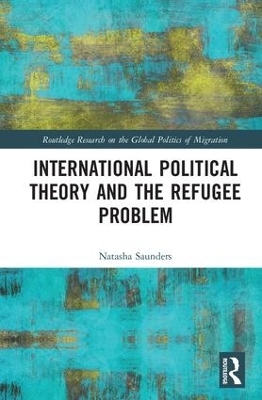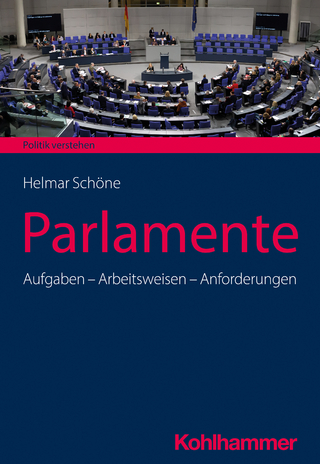
International Political Theory and the Refugee Problem
Seiten
2017
Routledge (Verlag)
978-1-138-23566-3 (ISBN)
Routledge (Verlag)
978-1-138-23566-3 (ISBN)
An engagement with the works of Michel Foucault and Hannah Arendt, International Political Theory and the Refugee Problem isa work of problem-driven political theory which explores "the refugee problem" as an epistemological and discursive construct.
‘The refugee problem’ is a term that it has become almost impossible to escape. Although used by a wide range of actors involved in work related to forced migration, these actors do not often explain what exactly ‘the problem’ is that they are working to solve, leading to an unfortunate conflation of two quite different ‘problems’: the problems that refugees face and the problems that refugees pose.
Beginning from the simple, yet too often overlooked, observation that how one conceives of solving a problem is inseparable from what one understands that problem to be, Saunders’ study explores the questions raised about how to address ‘the refugee problem’ if we recognise that there may not be just one ‘problem’, and that not all actors involved with the refugee regime conceive of their work as addressing the same ‘problem’. Utilising the work of Michel Foucault, the book first charts how different ‘problems’ lend themselves to particular kinds of solutions, arguing that the international refugee regime is best understood as developed to ‘solve’ the refugee (as) problem, rather than refugees’ problems. Turning to the work of Hannah Arendt, the book then reframes ‘the refugee problem’ from the perspective of the refugee, rather than the state, and investigates the extent to which doing so can open up creative space for rethinking the more traditional solutions to the refugee (as) problem. Cases of refugee protest in Europe, and the burgeoning Sanctuary Movement in the UK, are examined as two sub-state and popular movements which could constitute such creative solutions to a reframed problem.
The consequences of the ‘refugee’ label, and of the discourses of humanitarianism and emergency is a topic of critical concern, and as such, the book will form important reading for a scholars and students of (international) political theory and forced migration studies.
‘The refugee problem’ is a term that it has become almost impossible to escape. Although used by a wide range of actors involved in work related to forced migration, these actors do not often explain what exactly ‘the problem’ is that they are working to solve, leading to an unfortunate conflation of two quite different ‘problems’: the problems that refugees face and the problems that refugees pose.
Beginning from the simple, yet too often overlooked, observation that how one conceives of solving a problem is inseparable from what one understands that problem to be, Saunders’ study explores the questions raised about how to address ‘the refugee problem’ if we recognise that there may not be just one ‘problem’, and that not all actors involved with the refugee regime conceive of their work as addressing the same ‘problem’. Utilising the work of Michel Foucault, the book first charts how different ‘problems’ lend themselves to particular kinds of solutions, arguing that the international refugee regime is best understood as developed to ‘solve’ the refugee (as) problem, rather than refugees’ problems. Turning to the work of Hannah Arendt, the book then reframes ‘the refugee problem’ from the perspective of the refugee, rather than the state, and investigates the extent to which doing so can open up creative space for rethinking the more traditional solutions to the refugee (as) problem. Cases of refugee protest in Europe, and the burgeoning Sanctuary Movement in the UK, are examined as two sub-state and popular movements which could constitute such creative solutions to a reframed problem.
The consequences of the ‘refugee’ label, and of the discourses of humanitarianism and emergency is a topic of critical concern, and as such, the book will form important reading for a scholars and students of (international) political theory and forced migration studies.
Natasha Saunders is a lecturer at the University of St Andrews. Her research interests fall within the field of international political theory, with a focus on issues of human rights, migration, statelessness, inclusion/exclusion, and identity.
Introduction: Out of profound concern: for whom? 1. On Refugee Problems: The Development of a Problem and a Regime 2. Michel Foucault, Governmentality and the State: The Emergence of the Refugee (as) Problem 3. Power, Knowledge and the Subject: Managing the Refugee (as) Problem 4. Hannah Arendt and the Refugee Problem: Worldlessness and Superfluity 5. Making Oneself at Home in the World: Solutions to Refugees’ Problems Conclusion: On Durability and Permanence
| Erscheinungsdatum | 09.12.2017 |
|---|---|
| Reihe/Serie | Routledge Research on the Global Politics of Migration |
| Verlagsort | London |
| Sprache | englisch |
| Maße | 152 x 229 mm |
| Gewicht | 408 g |
| Themenwelt | Sozialwissenschaften ► Politik / Verwaltung ► Politische Theorie |
| Sozialwissenschaften ► Soziologie | |
| ISBN-10 | 1-138-23566-0 / 1138235660 |
| ISBN-13 | 978-1-138-23566-3 / 9781138235663 |
| Zustand | Neuware |
| Haben Sie eine Frage zum Produkt? |
Mehr entdecken
aus dem Bereich
aus dem Bereich
Der »progressive« Angriff auf Israel, Judentum und …
Buch | Softcover (2024)
edition TIAMAT (Verlag)
28,00 €
ein Vortrag
Buch | Softcover (2024)
Suhrkamp (Verlag)
10,00 €
Aufgaben, Arbeitsweisen, Anforderungen
Buch | Softcover (2024)
Kohlhammer (Verlag)
28,00 €


